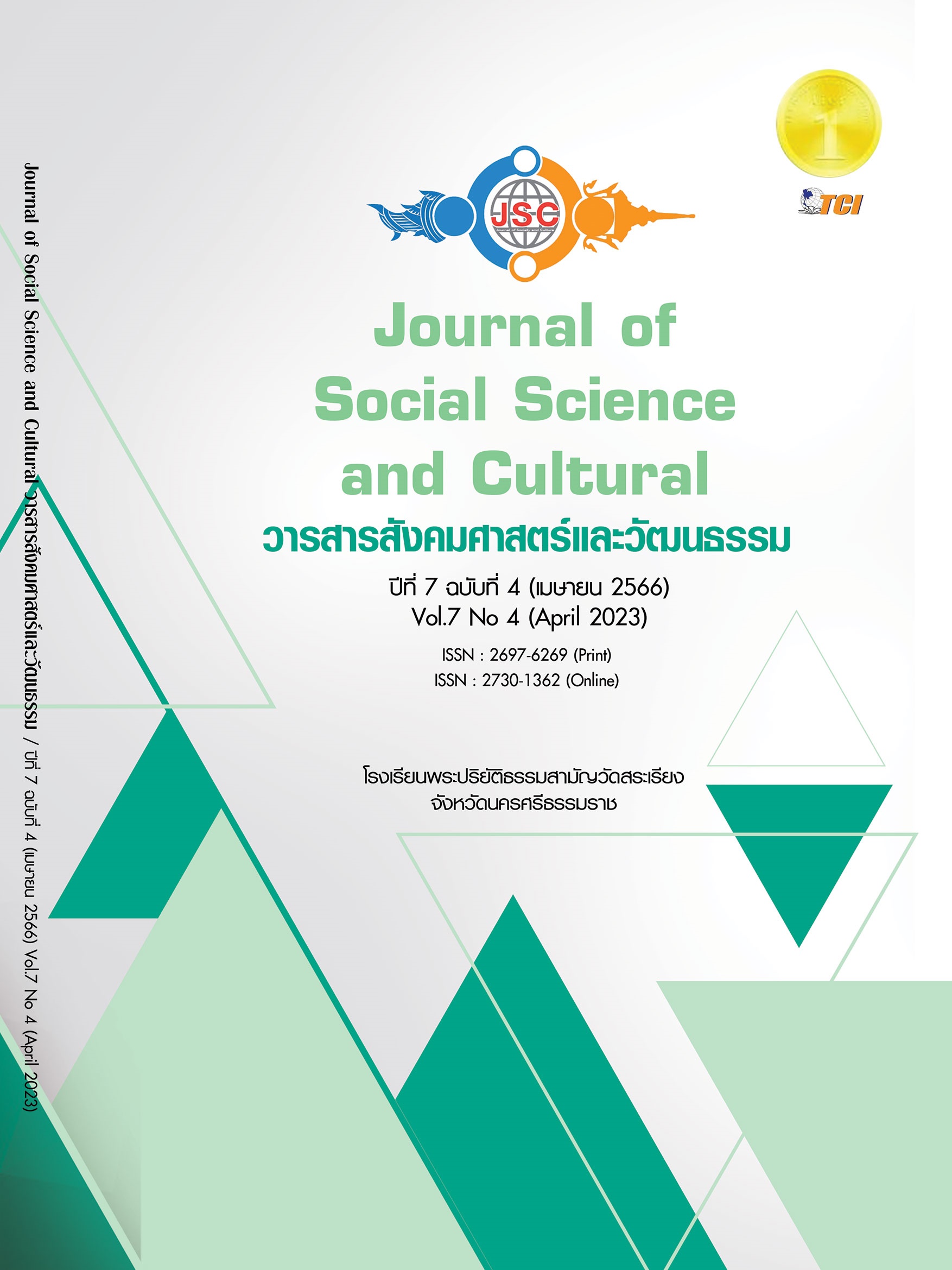COMMUNITY FOREST AND GOOD QUALITY OF LIFE OF BAN TON TONG COMMUNITY, PICHAI SUB-DISTRICT, MUEANG LAMPANG DISTRICT, LAMPANG PROVINCE
Main Article Content
Abstract
This article has the objective to present information about the economy and good quality of life for people in Ban Ton Tong community, Phichai Subdistrict, Mueang District, Lampang Province who benefit from community forest management by community people and government agencies in the area as follows: 1) Environmental benefits to solve watershed problems. That affects the occupation of agriculture consumption and prevention of forest fire problems, etc. 2) Social benefits: create cooperation in forest management activities, which are working for the public. Which affects love and unity that can affect other activities together in the community Both in religion and belief, occupation forming community enterprises or cooperatives as appropriate; and 3) Economic benefits are obtained in the form of forest harvesting. As the law allows for consumption and household consumption. Some people collect them to sell to supplement their family income. The people in the community when it comes to the harvesting season will have an income of about 10,000 -30,000 baht, which consists of oyster mushrooms, grilled mushrooms, various mushrooms, wild vegetables, bamboo shoots, crocus, honey, wasp nests, red ant eggs, and medicinal plants. There are also processing products to add value from community forests, such as mushrooms in brine. Red ant eggs in brine Dried Star gooseberry, etc., which generates income for people in the community to be able to earn another living. There is also a community culture trend. Which emphasizes the community to use local wisdom and the initiative of people in the community to develop Build a self-reliant economy as much as possible. Do not let the community fall into the mechanism of the market system.
Article Details
References
กฎกระทรวงแบ่งส่วนราชการกรมป่าไม้ กระทรวงทรัพยากรธรรมชาติและสิ่งแวดล้อม. ( 2551). ราชกิจจานุเบกษา. เล่ม 125 ตอนที่ 63 ก. หน้า 10-11. (2 พฤษภาคม 2551).
ดุสิต เวชกิจ. (2562). ประโยชน์จากป่าชุมชน. เรียกใช้เมื่อ 21 ตุลาคม 2565 จาก https://www.recoftc.org/
เดือนนภา ภู่ทอง. (2561). การจัดการป่าชุมชนเพื่อความยั่งยืน โดยการใช้กระบวนการมีส่วนร่วมสาธารณะและจารีตประเพณีท้องถิ่นในพื้นที่ภาคเหนือ. วารสารนวัตกรรมการบริหารและการจัดการ, 6(2), 82-83.
นางยุพิน ด้วงคำฟู. (1 ตุลาคม 2565). ประโยชน์ทางด้านเศรษฐกิจของป่าชุมชน. (ณัฐนนท์ จิรกิจนิมิตร, ผู้สัมภาษณ์)
นายวีระพล ยะสุทธิ. (1 ตุลาคม 2565). ประโยชน์ทางด้านสังคมของป่าชุมชน . (ณัฐนนท์ จิรกิจนิมิตร, ผู้สัมภาษณ์)
บริบูรณ์ บุญยู่ฮง. (2564). การพัฒนากระบวนการวางแผนจัดการป่าชุมชนแบบมีส่วนร่วม กรณีศึกษา 26 ชุมชนนำร่อง จังหวัดลำปาง. ใน รายงานการวิจัย. สำนักงานการวิจัยแห่งชาติ.
พระราชบัญญัติป่าไม้. (2484). ในพระปรมาภิไธยสมเด็จพระเจ้าอยู่หัวอานันทมหิดล คณะผู้สำเร็จราชการแทนพระองค์ (ตามประกาศประธานสภาผู้แทนราษฎร ลงวันที่ 4 สิงหาคม พุทธศักราช 2480). เรียกใช้เมื่อ 3 ตุลาคม 2565 จาก http://www. oic.go.th/FILEWEB/CABINFOCENTER11/DRAWER030/GENERAL/DATA0000/00000350.PDF
สมพร สติแน่. (2565). “ข้อมูลพื้นฐานทั่วไปขององค์การบริหารส่วนตำบลพิชัย”. แก้ไขครั้งล่าสุด 2565. องค์การบริหารส่วนตำบลพิชัย. เรียกใช้เมื่อ 24 มกราคม 2565 จาก http://www.pichai.go.th/th
สมศักดิ์ สุขวงศ์. (2562). ความหมายและมุมมองต่อ พรบ.ป่าชุมชน ของอาจารย์สมศักดิ์ สุขวงศ์. เรียกใช้เมื่อ 21 ตุลาคม 2565 จาก https://www.recoftc.org/
สมหญิง สุนทรวงษ์. (2557). ป่าชุมชนกับสังคมไทย. ศูนย์วนศาสตร์ชุมชนเพื่อคนกับป่า – ประเทศไทย RECOFTC - The Center for People and Forests P.O. Box 1111. กรุงเทพมหานคร: มหาวิทยาลัยเกษตรศาสตร์.
สำนักจัดการป่าชุมชน กรมป่าไม้. (2557). ป่าชุมชน. (พิมพ์ครั้งที่ 2). กรุงเทพมหานคร: สำนักจัดการป่าชุมชน กรมป่าไม้.
อเนก เหล่าธรรมทัศน์. (2557). สร้างการปกครองท้องถิ่นให้รากฐานของประชาธิปไตย. กรุงเทพมหานคร: มหาวิทยาลัยธรรมศาสตร์.


